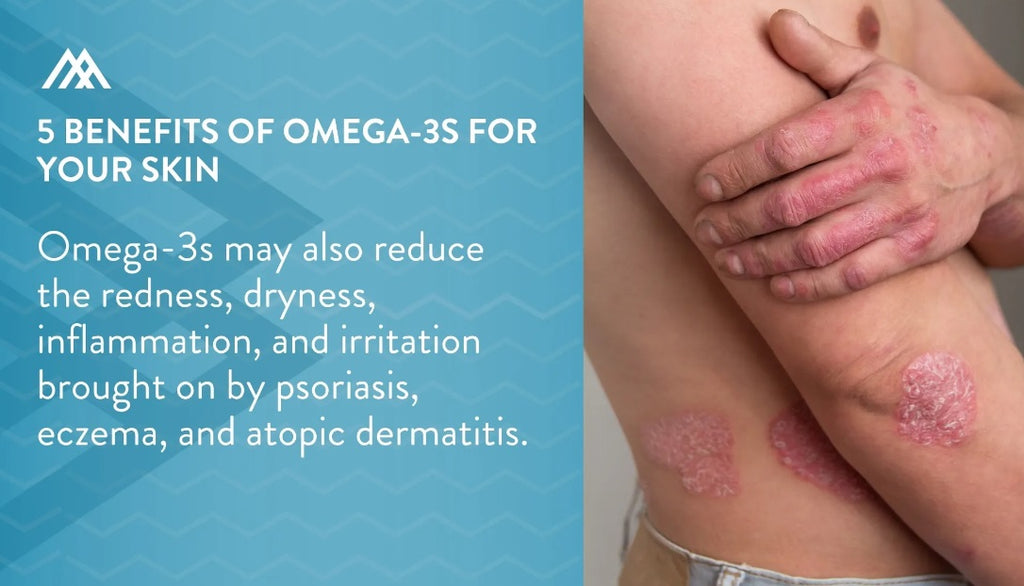Your Cart is Empty

March 25, 2021 4 min read

Omega-3 fatty acids are important components of skin cell membranes that surround every cell in the human body. There are three types of omega-3s: alpha-linolenic acid (ALA), eicosapentaenoic acid (EPA), and docosahexaenoic acid (DHA). Each type of omega-3 is found in different concentrations throughout the body, and each has an important role. For example, DHA is found primarily in the retina (eye), brain, and sperm cells. Omega-3s also provide energy to your body in the form of calories. They have many health benefits for your heart, blood vessels, lungs, immune system, and endocrine system.
Omega-3 is an essential fatty acid under the umbrella term polyunsaturated fatty acid (PUFA), meaning it cannot be produced by the body. Therefore, we rely entirely on foods and supplements to get it. You can get omega-3s through your diet in foods like fish, walnuts, flaxseed, chia seeds, seafood, and fatty fish like cod, salmon and sardines. It can be difficult for vegans and vegetarians to get enough omega-3 through diet alone, thus dietary supplementation is often recommended. Fish oil supplements are the most popular, dietary, omega-3 supplement, but new vegan alternatives are emerging. Amandean's Vegan Omega-3 Capsules are sourced from marine algae. They're a highly bioavailable, eco-friendly, vegan alternative to fish oil that have all of the same benefits for your heart and skin health.

As we mentioned above, omega-3 is a type of essential fatty acid but it's not the only one. Omega-3s work in tandem with omega-6 fatty acids to support your skin function and appearance. The omega-6 polyunsaturated fatty acids (PUFAs) have a particular role in the barrier function of the skin. The skin barrier is what allows your skin to retain nutrients and hydration. Together with omega-3s, they create important signaling molecules called eicosanoids, which influence the inflammatory response in the skin. Taking an omega-3 supplement, on top of its many heart-healthy benefits, can also help your skin to look and feel healthier in the following ways:
Take our quiz and find which supplements your body is craving.



Omega-3s may benefit the skin, but they should not be the sole method of achieving a youthful glow. Low-sugar diets that include skin-loving ingredients like zinc, selenium, enzyme Q10, collagen, prebiotics, antioxidants, and omega-3 fatty acids have been linked to healthy skin. Wherever your diet falls short, supplements can fill in the gaps.
If you have a specific skin condition or concern, seek medical advice from your doctor or dermatologist to find your perfect balance of supplements and delicious wholesome foods.
Omega-3s provide energy to your body in the form of calories and have many health benefits for your heart, blood vessels, lungs, immune system, and endocrine system.
Omega-3s work in tandem with omega-6 fatty acids to support your skin function and appearance.
Omega-3s can reduce the redness, dryness, inflammation, and irritation brought on by psoriasis, eczema, and atopic dermatitis.
By protecting the skin barrier and promoting the development of lipids within the skin, omega-3s may help the skin to look and feel smoother and retain moisture longer.

December 12, 2025 7 min read
Achieve luscious locks with collagen for hair. Try Amandean’s premium collagen supplements for stronger, healthier hair.

December 12, 2025 10 min read
Collagen packets by Amandean make skin, joint, and hair support easy on the go. Learn how collagen packets work and upgrade your wellness routine today.

October 17, 2025 8 min read
Find out why creatine is better for vegans! Boost your wellness game and unlock peak performance with Amandean's premium supplements today.